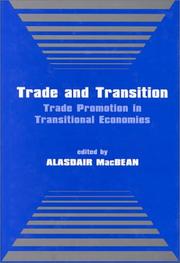| Listing 1 - 10 of 869 | << page >> |
Sort by
|
Book
Year: 2009 Publisher: [Washington, D.C.] : U.S. Govt. Accountability Office,
Abstract | Keywords | Export | Availability | Bookmark
 Loading...
Loading...Choose an application
- Reference Manager
- EndNote
- RefWorks (Direct export to RefWorks)
Book
Year: 2006 Publisher: [Washington, D.C.] : United States International Trade Commission,
Abstract | Keywords | Export | Availability | Bookmark
 Loading...
Loading...Choose an application
- Reference Manager
- EndNote
- RefWorks (Direct export to RefWorks)
Book
ISBN: 9782705702502 2705702504 Year: 1975 Publisher: Suresnes: Editions Hommes et techniques,
Abstract | Keywords | Export | Availability | Bookmark
 Loading...
Loading...Choose an application
- Reference Manager
- EndNote
- RefWorks (Direct export to RefWorks)
Book
Year: 1960 Publisher: Leuven: Katholieke Universiteit Leuven,
Abstract | Keywords | Export | Availability | Bookmark
 Loading...
Loading...Choose an application
- Reference Manager
- EndNote
- RefWorks (Direct export to RefWorks)

ISBN: 1135304572 1315039745 1135304505 9781135304508 9781135304577 9781315039749 9781135304645 1135304645 9780714650340 071465034X 9780714680880 0714680885 Year: 2014 Publisher: Hoboken Routledge
Abstract | Keywords | Export | Availability | Bookmark
 Loading...
Loading...Choose an application
- Reference Manager
- EndNote
- RefWorks (Direct export to RefWorks)
Export promotion covers various fiscal, commercial and exchange rate measures that governments can take to ensure some neutrality when comparing domestic and export markets. These essays discuss export promotion and its pros and cons.
Book
Year: 1988 Publisher: Cambridge, Mass. National Bureau of Economic Research
Abstract | Keywords | Export | Availability | Bookmark
 Loading...
Loading...Choose an application
- Reference Manager
- EndNote
- RefWorks (Direct export to RefWorks)
We explore in this paper the role of export subsidies when goods arriving from foreign countries are initially of unknown quality to domestic consumers, who learn about their quality only through consumption. If, when confronted with such goods, consumers view price as a signal of quality, a role for export subsidies can arise. In particular, we show that absent export subsidies, entry of high quality firms may be blocked by their inability to sell at prices reflecting their true quality. Export subsidies enable high quality producers to begin exporting profitably even while unable to credibly convey their high quality to consumers in the "introductory" period. Thus, in breaking the entry barrier for high quality firms, export subsidies can raise average quality in the market and a welfare-improving role for export subsidies emerges. Moreover, even when high quality firms find it possible to signal their high quality to consumers through an introductory pricing strategy, a role for government policy can arise: the signal (low introductory price) represents a transfer of surplus from foreign producers to domestic consumers which, as we show below, can be avoided with an appropriate export tax/subsidy policy.

ISBN: 0899300421 Year: 1984 Publisher: Westport (Conn.): Quorum
Abstract | Keywords | Export | Availability | Bookmark
 Loading...
Loading...Choose an application
- Reference Manager
- EndNote
- RefWorks (Direct export to RefWorks)
Book
Year: 2007 Publisher: [Washington, D.C.] : Office of Inspector General, Dept. of the Treasury,
Abstract | Keywords | Export | Availability | Bookmark
 Loading...
Loading...Choose an application
- Reference Manager
- EndNote
- RefWorks (Direct export to RefWorks)
Book
Year: 2013 Publisher: [Washington, D.C.] : United States Government Accountability Office,
Abstract | Keywords | Export | Availability | Bookmark
 Loading...
Loading...Choose an application
- Reference Manager
- EndNote
- RefWorks (Direct export to RefWorks)
Book
Year: 2001 Publisher: Washington, D.C.
Abstract | Keywords | Export | Availability | Bookmark
 Loading...
Loading...Choose an application
- Reference Manager
- EndNote
- RefWorks (Direct export to RefWorks)
| Listing 1 - 10 of 869 | << page >> |
Sort by
|

 Search
Search Feedback
Feedback About UniCat
About UniCat  Help
Help News
News